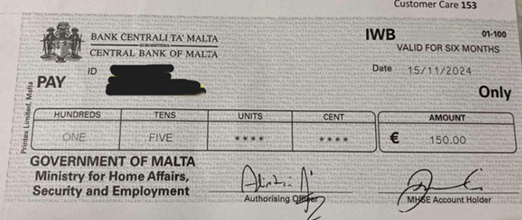Ministerial intervention in atypical hours benefit scheme fuels confusion

A peculiar incident involving Home Affairs Minister Byron Camilleri in a scheme for employees working atypical hours has raised serious questions about the management and transparency of this initiative.
The controversy centres on a group of care workers employed by a private contractor, who approached UHM Voice of the Workers seeking clarification on their eligibility for the atypical in-work benefit scheme announced in the 2024 Budget. The scheme provides a one-time €150 cash payment to private-sector workers who perform shift work on weekends or after 6 p.m. and have a basic salary not exceeding €20,000.
Eligibility confusion
According to the criteria listed on the Jobsplus website, the scheme is restricted to employees in specific sectors: “accommodation and food services, administrative and support services, manufacturing, transport and storage, or wholesale and retail trade.”
When the contractor representing the care workers inquired with Jobsplus, their request was denied, with officials citing the scheme’s strict sectoral limitations. Workers engaged in “care of the elderly and disabled” were excluded from eligibility, the contractor was told.
Ministerial letter raises eyebrows
Despite this initial rejection, some care workers some weeks later reported receiving the €150 payment. Documents reviewed by this portal revealed that the payment was issued via government cheque, accompanied by a letter signed by Minister Byron Camilleri, who is politically responsible for Jobsplus. Ironically, the letter referenced the same sectors mentioned by Jobsplus when the agency had ruled the workers ineligible.


This apparent reversal left care workers and their employer confused. The contractor reiterated that Jobsplus had explicitly stated the workers were not entitled to the grant, fuelling a contradiction that was flagged to UHM.
Ministry fails to give an explanation
Questions sent to the Home Affairs Ministry to clarify this development went unanswered at the time of writing. The lack of communication has only deepened concerns about potential discrepancies in how the scheme is being managed. Sources familiar with the matter expressed concern over the scheme’s design, particularly the decision to have the employees to apply through their employers rather than do this directly.
“This situation casts doubt on the scheme’s transparency,” one source remarked. “It seems that decisions about who qualifies might depend less on objective criteria and more on political intervention.”
Ministry reacts belatedly
In a belated reply which was only issued after this story was published the ministry insisted that care workers should have never received such benefit and called on this portal to divulge the details of the employees who received this benefit.
“Atypical benefit payments are issued in accordance with the job title of each respective employee and their registration with Jobsplus. Care workers are not included in this scheme. Therefore, if there are employees who are erroneously registered, please provide more information so we can take further action.”
Editorial Note: Such information should be readily available within the ministry itself. After all, the payments in question were issued directly by the ministry and accompanied by covering letters personally signed by the minister. It is reasonable to expect that records detailing these payments are maintained.
Moreover, such payments are issued through an application submitted by the employer and not simply according to the employee’s job title and their respective Jobsplus registration.
If these records are unavailable, we ask whether the ministry intends to launch an audit or investigation to clarify this matter and address any discrepancies.
Finally, we must emphasize that this portal is neither authorized nor equipped to provide the requested information. As we are not privy to internal records or data, our role has been to report on the issue and highlight the concerns raised by stakeholders, not to act as a source for the ministry’s internal data.
